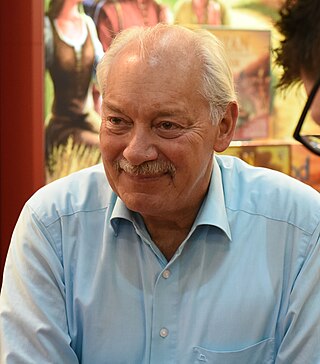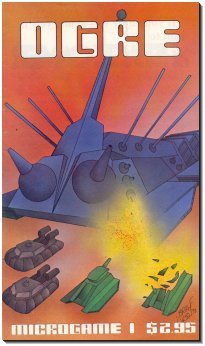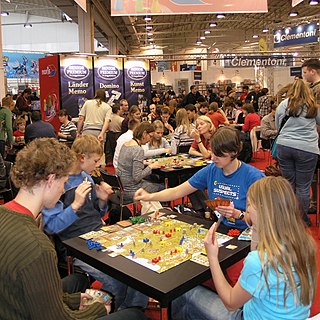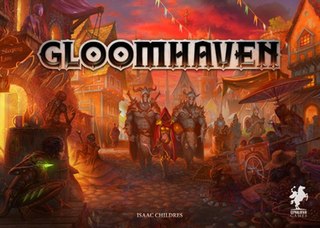Related Research Articles

A Eurogame, also called a German-style board game, German game, or Euro-style game, is a class of tabletop games that generally has indirect player interaction and multiple ways to score points. Eurogames are sometimes contrasted with American-style board games, which generally involve more luck, conflict, and drama. They are usually less abstract than chess or Go, but more abstract than wargames. Likewise, they generally require more thought and planning than party games such as Pictionary or Trivial Pursuit.

Richard Channing Garfield is an American mathematician, inventor and game designer. Garfield created Magic: The Gathering, which is considered to be the first collectible card game (CCG). Magic debuted in 1993 and its success spawned many imitations.

Steve Jackson Games (SJGames) is a game company, founded in 1980 by Steve Jackson, that creates and publishes role-playing, board, and card games, and the gaming magazine Pyramid.

Klaus Teuber was a German board game designer best known as the creator of Catan. Originally working as a dental technician, he began designing games first as a hobby then as a full-time career.

Reiner Knizia is a prolific German-style board game designer. He was born in West Germany in 1957 and earned a doctorate in Mathematics from the University of Ulm before designing games full time. He is frequently included on lists of the greatest game designers of all time. Many of his hundreds of designs are considered modern classics, and many have won or been nominated for significant gaming awards, including the Spiel des Jahres and the Deutscher Spiele Preis. His notable designs include Amun-Re, Blue Moon City, Ingenious, Keltis, Lord of the Rings, Medici, Modern Art, Ra, Taj Mahal, Tigris and Euphrates, and Through the Desert. Many of his designs incorporate mathematical principles, such as his repeated use of auction mechanics.

OGRE is a science fiction board wargame designed by the American game designer Steve Jackson and published by Metagaming Concepts in 1977 as the first microgame in its MicroGame line. When Steve Jackson left Metagaming to form his own company, he took the rights to OGRE with him, and all subsequent editions have been produced by Steve Jackson Games (SJG).
Tom Wham is a designer of board games who has also produced artwork, including that for his own games.

Keith Baker is an American game designer and fantasy novel author. In addition to working with Wizards of the Coast on the creation of Eberron, he has also contributed material for Goodman Games, Paizo Publishing and Green Ronin Publishing. In 2014, Baker and Jennifer Ellis co-founded the indie tabletop game company Twogether Studios.

Internationale Spieltage SPIEL, often called the Essen Game Fair after the city where it is held, is an annual four-day public boardgame trade fair held in October at the Messe Essen exhibition centre in Essen, Germany. It began in 1983. With 1,021 exhibitors from 50 nations in 2016, SPIEL is the biggest fair for board games in the world. Many new games are released at the fair each year, especially European-style board games.

The Coles is a colloquial term referring to Corey Cole and Lori Ann Cole, a husband and wife team who are both video game designers. Working together they designed the Quest for Glory series. They have also each designed games independently.

Alan R. Moon is an author of board games, born in Southampton, England. He is generally considered to be one of the foremost designers of German-style board games. Many of his games can be seen as board game variations on the travelling salesman problem.

Tactics is a board wargame published in 1954 by Avalon Hill as the company's first product. Although primitive by modern standards, it and its sequel, Tactics II, signalled the birth of modern board wargaming for the commercial market. Tactics is generally credited as being the first commercially successful board wargame.

Z-Man Games is an American board game company, incorporated in 1999. It was named after its founder, Zev Shlasinger. The company is known for their Pandemic series of board games, as well as being the sole publisher for the English editions of popular Eurogames, such as Carcassonne and Terra Mystica.

Bézier Games, Inc. is a privately owned American tabletop game publisher, known by hobby gamers for Castles of Mad King Ludwig and Suburbia, and known to casual gamers for the One Night Ultimate Werewolf series, Werewords, the Silver series, and Ultimate Werewolf. It was founded in San Jose, California in 2006 by Ted Alspach upon publication of Start Player. In 2013, the company was renamed Bézier Games, Inc. when it incorporated. The company moved to Louisville, Tennessee in 2016 run by Ted & Toni Alspach.

A gamemaster's screen, also called a GM's screen, is a gaming accessory, usually made out of either cardboard or card stock, and is used by the gamemaster to hide all the relevant data related to a tabletop role-playing game session from the players in order to not spoil the plot of the story. It also hides any dice rolls made by the gamemaster that players should not see. In addition, screens often have essential tables and information printed on the inside for the gamemaster to easily reference during play.
Alessio Cavatore is a game designer.
Zev Shlasinger is a scriptwriter, game designer and game publisher. He is primarily known for founding Z-Man Games, which became the publisher of the Pandemic series of board games, as well as being the sole publisher for the English editions of popular Eurogames, such as Carcassonne and Terra Mystica.

Gloomhaven is a cooperative board game for one to four players designed by Isaac Childres and published by Cephalofair Games in 2017. It is a campaign-based dungeon crawl game including a narrative campaign, 95 unique playable scenarios, and 17 playable classes. Since its introduction the game has been acclaimed by reviewers, and has been described as one of the best board games ever made.
Glory to Rome is a 2005 card-based board game designed by Ed Carter and Carl Chudyk and published by Cambridge Games. It received positive reviews, but in 2010s it became infamous due to being out of print which led to greatly inflated prices in the secondary market.

A board game café is a type of café in which patrons play board and card games while being served food and drink. Customers usually pay an entry fee or rent a table in order to access a large library of games and instruction from the staff on how to play them. Many board game cafés also sell the games.
References
- ↑ "Lorien Green discovered designer board gaming four years ago through her husband" . Retrieved 2012-04-25.
- ↑ "Going Cardboard - A Board Game Documentary - A Documentary project in Nashua" . Retrieved 2012-07-08.
- ↑ "Lorien's experience shows how you can use Kickstarter to fund a portion of your dream, breaking it up into manageable parts rather than attempting to do the entire project at once". Archived from the original on 2013-10-05. Retrieved 2012-07-08.
- ↑ "Featuring interviews with more than 30 top board game designers, publishers, reviewers and prominent figures in the hobby, and with a plethora of extras, this multi-zone DVD is ideal for the board game hobbyist, or as a tool to introduce non-gamers to our hobby" . Retrieved 2012-07-08.
- ↑ "Going Cardboard" . Retrieved 2012-07-08.
- ↑ "Dokumentarfilm "Going Cardboard": Warum Amerikaner deutsche Brettspiele lieben" . Retrieved 2012-04-25.